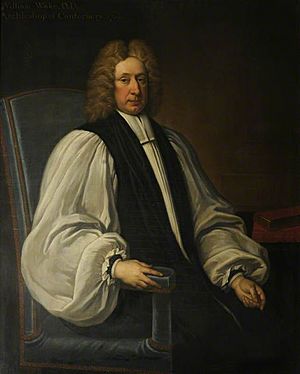William Wake facts for kids
Quick facts for kids The Most Reverend and Right Honourable William Wake |
|
|---|---|
| Archbishop of Canterbury | |

Portrait by Thomas Gibson
|
|
| Church | Church of England |
| Diocese | Canterbury |
| In Office | 1716–1737 |
| Predecessor | Thomas Tenison |
| Successor | John Potter |
| Orders | |
| Consecration | 21 October 1705 by Thomas Tenison |
| Personal details | |
| Born | 26 January 1657 Blandford Forum, Dorset, England |
| Died | 24 January 1737 (aged 79) Lambeth Palace |
| Buried | Croydon Minster |
| Nationality | English |
| Denomination | Anglican |
| Previous post | Dean of Exeter (1703–1705) Bishop of Lincoln (1705–1716) |
| Alma mater | Christ Church, Oxford |
William Wake (born January 26, 1657 – died January 24, 1737) was an important leader in the Church of England. He served as the Archbishop of Canterbury from 1716 until he passed away.
Contents
Early Life and Education
William Wake was born in a place called Blandford Forum in England. He went to Christ Church, Oxford for his education. In 1682, he traveled to Paris, France, to work as a chaplain for the English ambassador.
While in Paris, he met many smart people and learned a lot about the French church. He also helped study old manuscripts of the Greek New Testament.
Rise in the Church
Wake returned to England in 1685. He became a preacher at Gray's Inn in 1688. The next year, he joined Christ Church, Oxford as a canon.
In 1693, he became the rector of St James's Church, Piccadilly. Ten years later, he was made Dean of Exeter. In 1705, he became the bishop of Lincoln.
Archbishop of Canterbury
In 1716, William Wake became the Archbishop of Canterbury. This is a very high position in the Church of England. He took over after Thomas Tenison passed away.
Tenison had been a mentor to Wake. He helped Wake become a bishop, even though Queen Anne was not sure about it at first.
Working for Church Unity
As Archbishop, Wake tried to bring different churches closer together. In 1718, he talked with important French church leaders. They discussed the idea of uniting the French Catholic Church and the English Church. This was to help them stand strong against the power of Rome.
He also had a tolerant view towards Nonconformists. These were Protestants who did not follow the Church of England's rules. He even suggested changing the Prayer Book to make it easier for them to join.
Important Writings
William Wake wrote many books and papers. One of his most important works was State of the Church and Clergy of England... historically deduced (published in London, 1703).
In this book, he strongly defended the Church of England's traditions and leaders. He also showed that some old stories about the church were not true.
Later Life and Legacy
William Wake passed away at Lambeth Palace, which was his official home. He was the grandfather of a famous English geologist named Etheldred Benett.
He was buried in Croydon Minster in Surrey, England.
Collections
William Wake left his large collections of books, manuscripts, and coins to Christ Church. Among these were 31 books filled with his letters.
His manuscript collection also included many old New Testament manuscripts. These manuscripts came from Constantinople to England around 1731.
 | James B. Knighten |
 | Azellia White |
 | Willa Brown |

